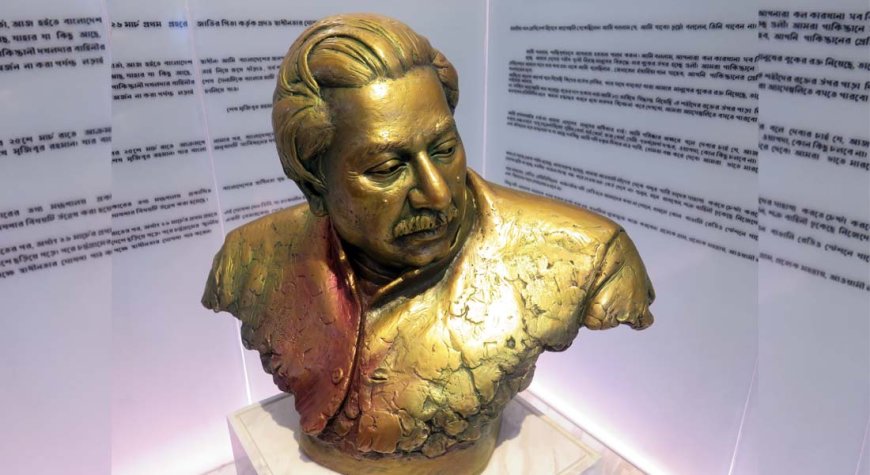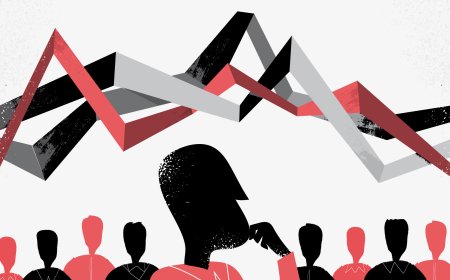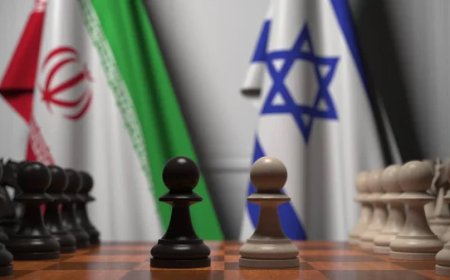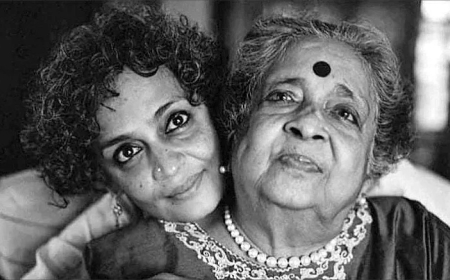The Spectre of Mujibism
Fighting against so-called 'Mujibism' is tilting at windmills. No such thing exists. We need to be vigilant about the authoritarian narratives and language practices that have begun anew in society centred around July.

A spectre is haunting the NCP leadership, the spectre of Mujibism.
But what is called Mujibism doesn't actually exist in Bangladesh in any real sense. Sheikh Mujib was a bourgeois nationalist leader. He spoke of democracy publicly, but he eventually turned out to be a power-hungry autocrat.
Consistent with the global context of that time, he had some inclination toward socialism. And from the practical experience of the sub-continent, he wanted to keep religion separate from politics.
Beyond this, Mujib had no such philosophical or intellectual capacity that he would give birth to a political ideology.
As a result, even his followers cannot properly explain Mujibism. No important texts can be found on this subject either. Mujibism is essentially a story fabricated by the League's opportunistic intellectuals with the aim of making the League's power absolute in the newly independent country.
There is room for doubt about whether Sheikh Mujib himself had any clear concept of Mujibism. Throughout history, many important political personalities around the world who spent long periods in prison created their valuable writings while in jail. But from Mujib, who spent thirteen long years in prison, we have not received any important writings where his original thoughts are recorded. What we get about Mujibism is only the narratives written by Mujib's admirers from 1972 to 1975.
Some people claim that Mujibism is nationalism, secularism, democracy, and socialism, which were adopted as fundamental principles of state governance in the 1972 constitution. None of these are the result of any original thinking by Mujib, and each has different interpretations and different histories of evolution.
Just as the concept of secularism in France is not the same as secularism in the United States, there is a vast difference between Soviet socialism and modern Chinese socialism. The same can be said about nationalism.
We find evidence that Mujib's nationalism and the concept of extreme Bengali nationalism are not the same in his speech after returning home from Pakistani prison, where he declared himself by saying: "I am a Muslim, I am a Bengali."
In the thinking of extreme Bengali nationalists, the element of religion is consciously unmentioned, unspoken, and ignored. Evidence that there is a vast difference between Mujib's concept of secularism and the secularism of so-called progressive Bengali nationalists is also found in Abul Mansur Ahmed's writings.
In his book "Fifty Years of Politics I Have Seen," he wrote that after December 16, 1971, when Islamic words and programs were banned from radio and television due to the wishes of overly enthusiastic progressives, these were resumed after Mujib's return to the homeland, and the people of the country breathed a sigh of relief.
Therefore, if we look for the roots of the fascist tendencies of the past fifteen years of Awami misrule in the so-called Mujibism, we would be making a mistake.
As a party, the Awami League has an opportunistic character. It cannot even be said that it has any particular ideology. The party has a history of taking whatever form suits it whenever it serves the interests of power.
Although everyone calls it fascist, I call it fake fascism. Real fascists never loot the country's resources and smuggle them abroad.
The League essentially established a looter mafia state in the country by relying on the fascist tendencies of Bengali nationalism. This is why hardcore Bengali fascists often became dissatisfied with the League.
If the Awami League were nationalist, it would not bow down to neighboring countries.
If it were secular, seventy percent of the country's religion-based parties could not have remained part of the Awami coalition.
Toward the end, it was seen that to appease religious fundamentalists, they promoted the narrative that Sheikh Mujib's ancestors came to this country from Arab countries to preach religion.
And in the past fifteen years, even the League's own people do not claim that democracy and socialism have been strengthened in the country.
Therefore, the fascist tendencies of Bengali nationalism cannot be countered by confining them merely to the term Mujibism.
Even if we consider the League's fifteen-year rule as the implementation of so-called Mujibism for argument's sake, we would see that there was no place for ideology there.
IGP Benazir or Beximco's Salman F Rahman did not engage in oppression and looting inspired by any ideology. The Awami League could not speak of implementing Mujibism during their rule. They had to speak of the spirit of the Liberation War.
What happened behind all this was a mafia rule formed by the combination of corrupt political forces, dishonest businessmen, and corrupt bureaucracy, which, with the support of regional and international powers, strengthened the roots of Hasina's power hunger.
Therefore, to emerge from the experience of Awami misrule, we need to find a way out of this triangular nexus of evil forces.
After the fall and flight of the League in the mass uprising, the war declaration for the elimination of Mujibism that is now being made in the market is essentially a war against windmills and empty political rhetoric.
If someone thinks they will do politics against Mujibism by considering it as a political ideology, they can certainly do so politically, intellectually, and culturally.
As a political strategy for the rightists including NCP, this might be fine.
But attempting to impose someone's party agenda on the entire nation in the name of July Aspirations, especially relying on the state's power of force, which may lead to bloodshed again, will not be acceptable in any way.
At the same time, it needs to be said that no one can determine which ideological politics will remain in Bangladesh and which will not. Because this tendency gives birth to fascism.
During the League's rule, the favourite narrative of Bengali nationalists was that both the government and the opposition parties in the country must be forces supporting the liberation war. They wanted to confine the entire country's politics within their self-determined boundaries. But the evidence that using force in politics produces opposite results is right before our eyes.
Therefore, doing the same thing now in the name of July Aspiration has no possibility of yielding different results.
Therefore, we need to be vigilant about the authoritarian narratives and language practices that have begun anew in society centred around July.
If this tendency continues, anyone who wants to see Bangladesh as a liberal democratic country based on justice and equality, free from the influence of religious extremism, will face the context of suppression with the label of Mujibist, and signs of this are already visible.
Every society has some fascist tendencies. When they receive the favour of state power, they turn into fascist forces. If such a possibility arises, the mafia state created by the League's hands, which is still intact, will not hesitate to take full advantage of it, and we will again enter a suffocating situation.
Murshid Shalin is a political analyst.
What's Your Reaction?

















































































